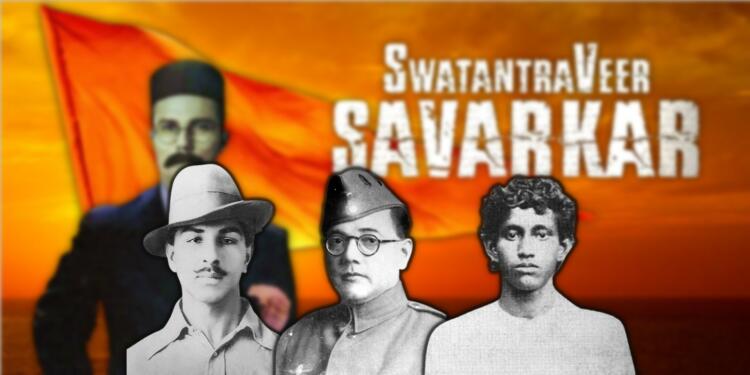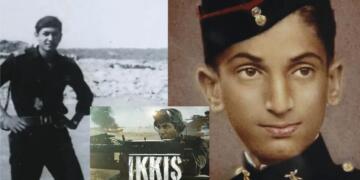Who can be outraged on the fact that Veer Savarkar inspired the likes of “Bhagat Singh, Subhas Chandra Bose and Khudiram Bose”? Well, some super intellectuals and relatives of the same do, who they that they have a copyright over the same.
Relatives and Limited Knowledge
Recent controversy surrounding the teaser of the film “Swatantryaveer Savarkar” has ignited a heated debate about the influence of Vinayak Damodar Savarkar, commonly known as Veer Savarkar, on prominent freedom fighters like Bhagat Singh, Netaji Subhas Chandra Bose, and Khudiram Bose. While some intellectuals and relatives claim exclusive rights over this historical narrative, it is essential to question the authenticity of their knowledge and consider the diverse perspectives surrounding this topic.
Addressing the relatives of freedom fighters, it is important to acknowledge that being a relative does not automatically confer expertise or comprehensive knowledge on the subject. History is a vast and intricate tapestry, woven together by multiple sources, perspectives, and interpretations. Therefore, relying solely on familial connections to assert authority on historical matters may not present a complete and unbiased understanding.
Also read: Randeep Hooda’s Transformational Acting in “Swatantrya Veer Savarkar”: A Game-Changer
Savarkar’s Inspiration on Freedom Fighters
The claim that Veer Savarkar inspired the likes of Bhagat Singh, Netaji Subhas Chandra Bose, and Khudiram Bose has sparked outrage among some individuals. However, it is not unreasonable to acknowledge the influence that Savarkar’s ideas had on these notable figures.
Bhagat Singh, a prominent revolutionary and martyr, did find inspiration in Savarkar’s ideology, particularly his emphasis on cultural nationalism. Although the Marxists may grudgingly admit this fact, it does not diminish Singh’s contributions or undermine the multifaceted nature of his motivations.
Similarly, Netaji Subhas Chandra Bose, an iconic leader in the struggle for independence, had multiple interactions with Savarkar and was seemingly influenced by his fierce approach to nationalism. While the extent of this influence may be a matter of debate, it highlights the complex interplay of ideas and influences among freedom fighters during that era.
The Role of Relatives and Authenticity
The objections raised by dignitaries and relatives of freedom fighters regarding the portrayal of Savarkar’s influence in the film’s teaser merit consideration. However, it is crucial to question whether the information possessed by relatives is always authentic and based on first-hand accounts.
History often undergoes reinterpretation as new evidence and perspectives emerge, challenging previously accepted narratives. Relatives, despite their emotional connection to their ancestors, may not possess a complete and unbiased understanding of their actions, motivations, or influences. Therefore, it is necessary to approach historical accounts with an open mind, considering multiple sources and viewpoints.
Also read: “Sirf Ek Bandaa Kaafi Hai”: A Gripping Courtroom Drama Unveiling the Pursuit of Justice
Biographies and Representation
To further explore the topic, one can analyze the effectiveness of biographies written by close relatives of historical figures. While exceptions exist, the broader trend reveals that biographies penned by individuals with a familial connection may not always achieve widespread acclaim or become bestsellers.
For example, the biography on Jawaharlal Nehru stands as a rare exception, while the iconic movie “Shaheed” about Bhagat Singh was written by Batukeshwar Dutt, not a direct relative. This observation emphasizes the importance of diverse perspectives and the involvement of independent researchers and writers to offer a more objective understanding of historical events.
The controversy surrounding the portrayal of Veer Savarkar’s influence on freedom fighters in the teaser of “Swatantryaveer Savarkar” highlights the need for open-mindedness, inclusivity, and critical examination of historical narratives. While relatives’ perspectives can offer valuable insights, they should not be treated as the sole authority on complex historical events.
Understanding the historical context and acknowledging the multifaceted influences on freedom fighters is crucial for a comprehensive comprehension of India’s struggle for independence. By embracing diverse perspectives and engaging in rigorous research, we can foster a more nuanced understanding of the lives and motivations of those who played pivotal roles in shaping the nation’s history.
Support TFI:
Support us to strengthen the ‘Right’ ideology of cultural nationalism by purchasing the best quality garments from TFI-STORE.COM




























